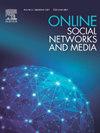Mitigating radicalization in recommender systems by rewiring graph with deep reinforcement learning
IF 2.9
Q1 Social Sciences
引用次数: 0
Abstract
Recommender systems play a crucial role in enhancing user experiences by suggesting content based on users consumption histories. However, a significant challenge they encounter is managing the radicalized contents spreading and preventing users from becoming trapped in radicalized pathways. This paper address the radicalization problem in recommendation systems (RS) by proposing a graph-based approach called Deep Reinforcement Learning Graph Rewiring (DRLGR). First, we measure the radicalization score (Rad(G)) for the recommendation graph by assessing the extent of users’ exposure to radical content. Second, we develop a Reinforcement Learning (RL) method, which learns over time which edges among many possible ones should be rewired to reduce the Rad(G). The experimental results on video and news recommendation datasets show that DRLGR consistently reduces the radicalization score and demonstrates more sustained improvements over time, particularly in more complex graphs compared to baseline methods and heuristic approach such as HEU that may reduce radicalization more rapidly in the early stages with fewer interventions but plateau over time.
通过深度强化学习重新布线图来缓解推荐系统中的激进化
推荐系统通过根据用户的消费历史来推荐内容,在增强用户体验方面发挥着至关重要的作用。然而,他们面临的一个重大挑战是如何控制激进内容的传播,防止用户陷入激进的路径。本文通过提出一种称为深度强化学习图重新布线(DRLGR)的基于图的方法来解决推荐系统(RS)中的激进化问题。首先,我们通过评估用户接触激进内容的程度来衡量推荐图的激进得分(Rad(G))。其次,我们开发了一种强化学习(RL)方法,该方法随着时间的推移学习应该重新连接许多可能的边缘以减少Rad(G)。在视频和新闻推荐数据集上的实验结果表明,DRLGR持续降低激进化得分,并随着时间的推移显示出更持久的改善,特别是在更复杂的图表中,与基线方法和启发式方法(如HEU)相比,后者可能在早期阶段更快地减少激进化,干预较少,但随着时间的推移会趋于平稳。
本文章由计算机程序翻译,如有差异,请以英文原文为准。
求助全文
约1分钟内获得全文
求助全文
来源期刊

Online Social Networks and Media
Social Sciences-Communication
CiteScore
10.60
自引率
0.00%
发文量
32
审稿时长
44 days
 求助内容:
求助内容: 应助结果提醒方式:
应助结果提醒方式:


